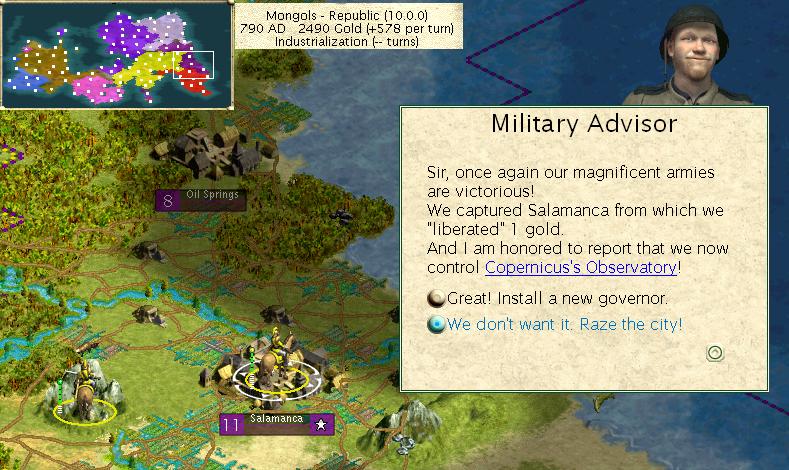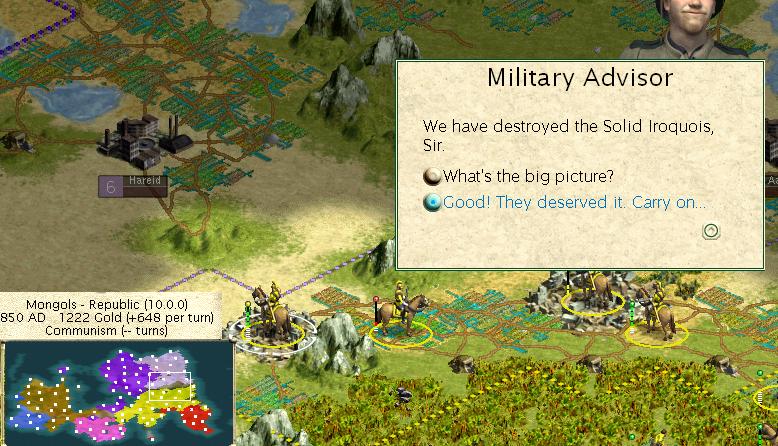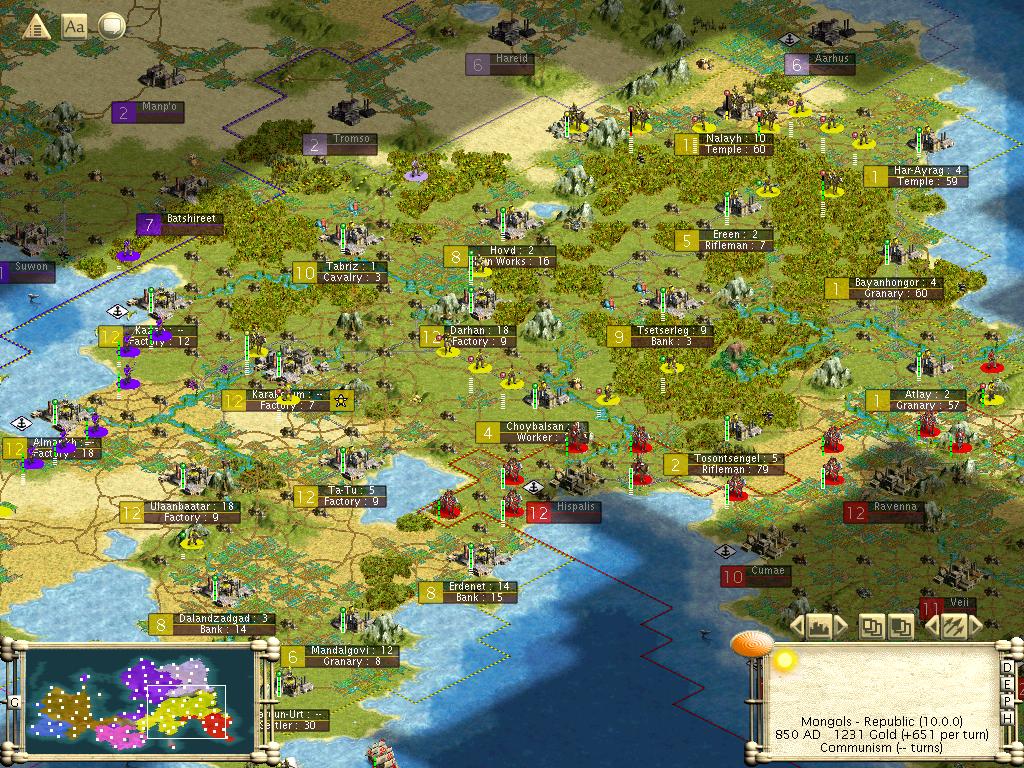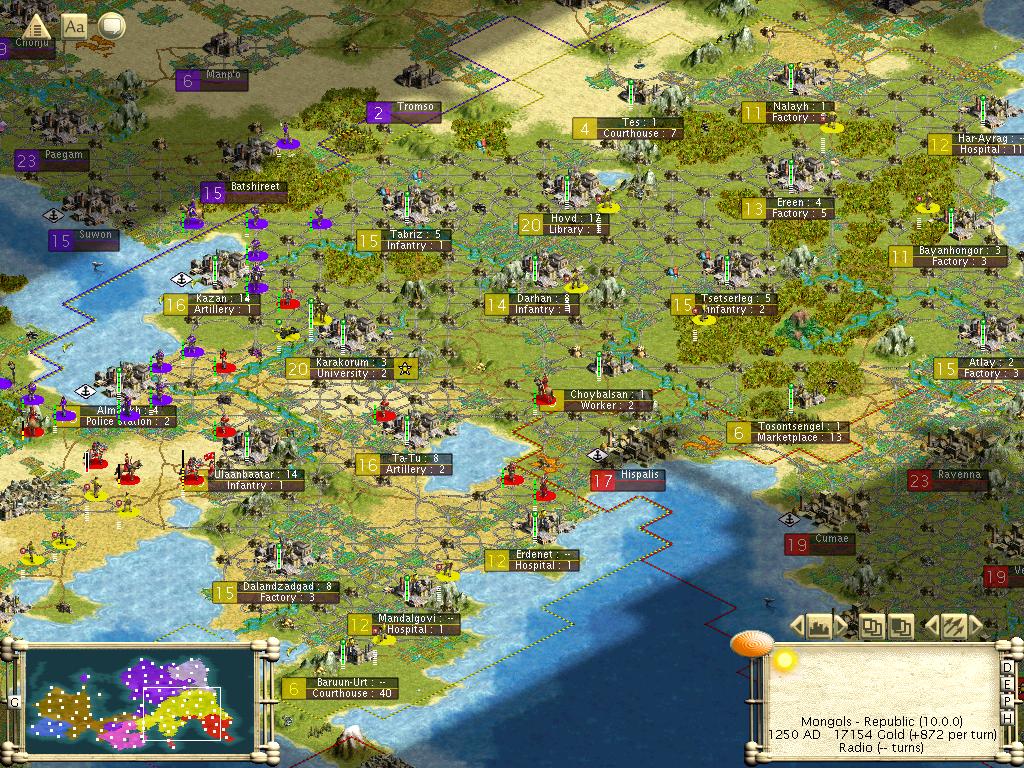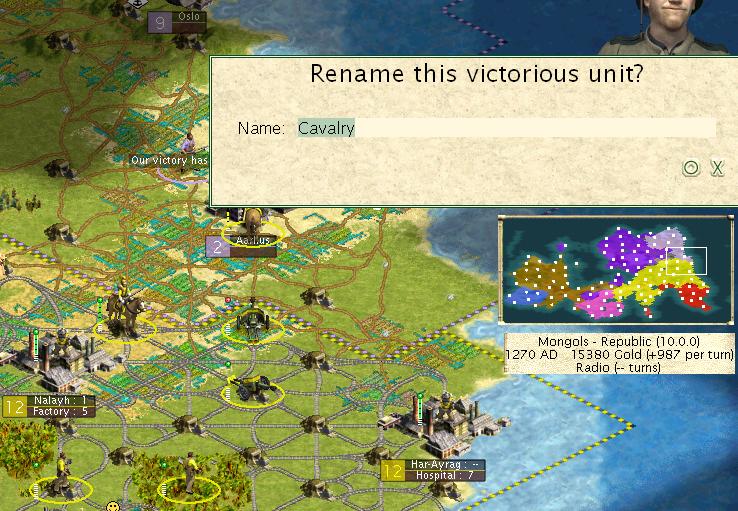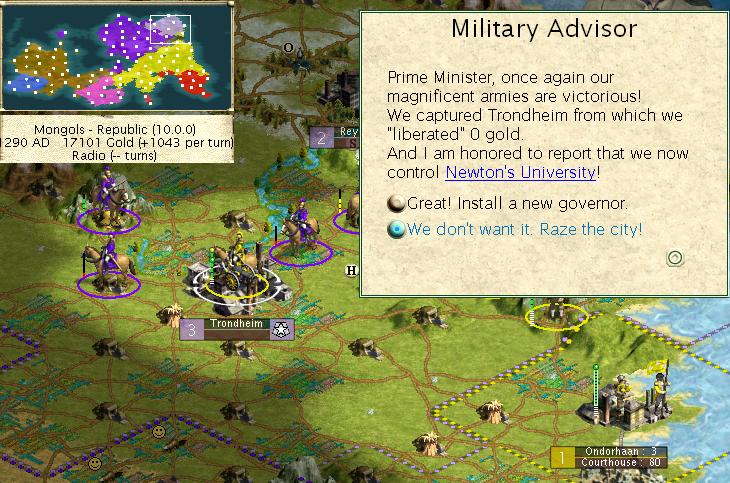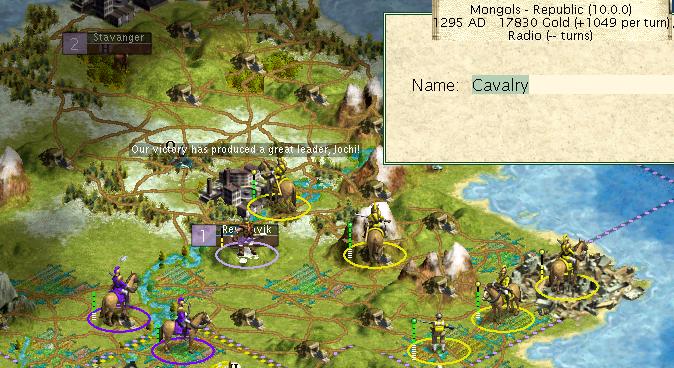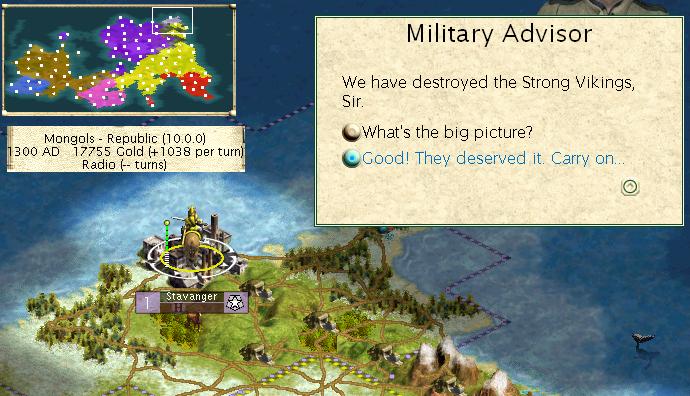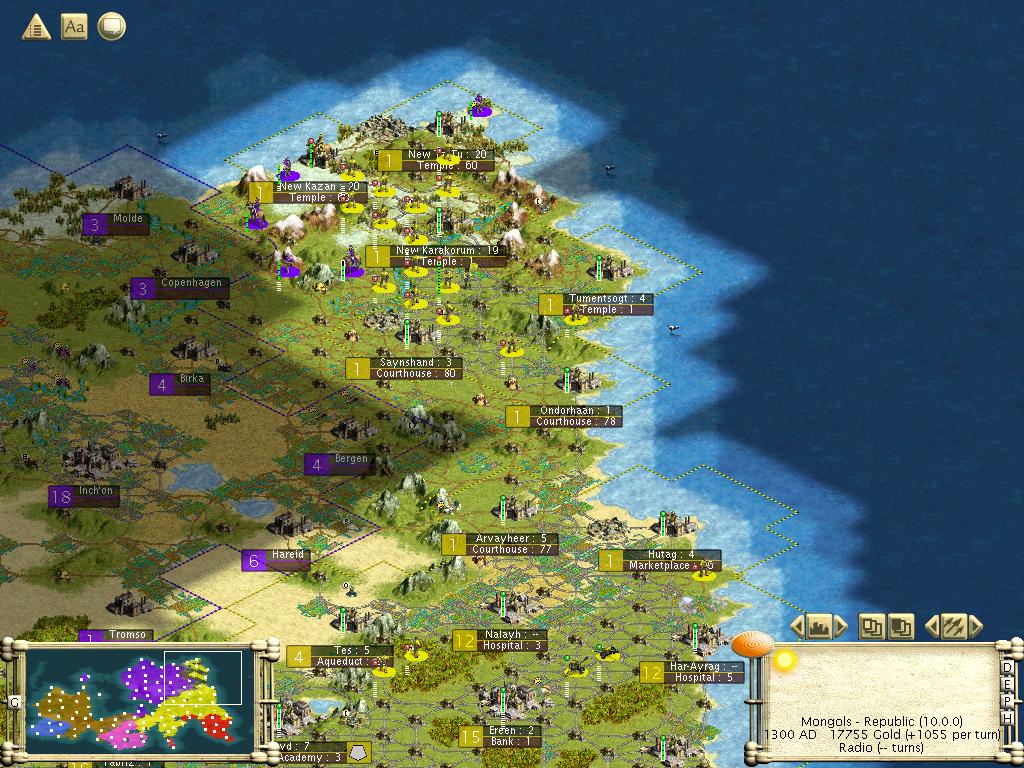Sullla
Patrician Roman Dictator
"Salamanca, 790AD"
Written by Sullla
Temujin mopped his brow free of the sweat that lightly dewed his forehead. Within seconds a fresh dribble of moisture burst out, due undoubtably to the sweltering summer heat in these tropical latitudes. Accepting the inevitable with regards to the climate, he turned to review his gathered army once again on the plains below his high vantage point.
The khan had assembled a mighty force here to do battle with the Iroquois, upon whom the Mongols had recently declared war. Equipped with new cavalry forces, they had already razed the city of Niagra to the ground and moved deep into the territory of the Iroquois Confederacy, seeking to destroy the capital city and smash the power of their foes once and for all. This mission was considered important enough for Temujin to risk going himself in person to command the armed forces; for as good as his generals were in battle, no one was as skilled as the wily khan. After weeks of marching through enemy territory, he knew that today was the day in which the campaign would be decided. The city of Salamanca lay just over the horizon in the east, close enough that last night they could see its lights shining out against the darkness. Drawn up to meet them in front of the city was a vast host of forces, considerably larger than what Temujin had brought, there to make a final stand outside their beloved capital. Rumor had it that Hiawatha was commanding the Iroquois army in person; Temujin hoped that it was so, because he knew that the chief was no general and would likely make serious mistakes in the heat of battle.
There was little to do this morning; he had already made his rousing speech to the men last night around the blazing light of huge bonfires, letting the sound of their answering roars echo out and down the grasslands below to the city where the people would cower in fear at the noise. The plan for today's action was already set as well, at least as much as any plan could exist before a battle, but Temujin stopped to speak with his two right-hand men one more time.
"Yes, yes, I know; my job is to command the left cavalry wing and defend our flank on that side," said Magdalai tonelessly. He once again had the blue-collar job to play in this battle, with the goal of defending the left from Hiawatha's cavalry. "I won't let you down in this fight, sir," said the man in sincere tones.
Temujin liked Magdalai a lot; another individual who had virtually no recognizable talents but scraped, clawed, and bit his way into power and authority. Unlike his other general for today's action, he could afford to give Magdalai a longer leash. "Good. If you see an opportunity in today's battle, I want you to take it. Anything can happen out there, and I don't want you held back by outdated orders. You have my trust in your decision-making abilities."
"Thank you sir!" exclaimed the other man. Temujin nodded and left, leaving a very eager Magdalai behind. The khan was known for keeping everyone working for him under very tight control; this was truly an honor indeed.
Magdalai was already out of Temujin's mind, however, as he strode up to the tent of his other commander for the day. Ogodei was in charge of the right side of the line; his cavalry would be the striking arm of the Mongol force, with the goal of punching through the opposing Iroquois force and taking the enemy army from behind. It was the sort of straight-forward task that the bull-headed Ogodei should be able to handle well - so long as nothing unexpected came up. That was the one thing that Temujin worried about.
"Oh, what am I supposed to do today?" said Ogodei blankly when pressed on the issue by Temujin. "Uhh, charge, of course! Don't worry, we'll carve them to bits and smash the rest of those guys from behind. It'll be easy!" he promised offhandedly.
"See that it is," was the curt response from Temujin. He was holding the center of the line today, back with the reserves to deploy them when and where necessary. If all went well, Ogodei would break through on the right side and he would send his forces to exploit the gaps in the Iroquois lines. The Mongols were outnumbered today, but Temujin well knew that an army attacked from behind or in flank could quickly turn into a panicked mess, easily slaughtered by a much smaller force. He also expected to have a technological edge, as his cavalry was equipped with rifles while the Iroquois still fielded knights in armor and even Mounted Warriors with bows and arrows. It would have to be enough; there was no longer time to make more changes.
Barely an hour later the two armies were drawn up on opposing sides of the field, facing one another across an expanse of several hundred yards. Temujin had five divisions of infantry in his front line, mostly equipped with muskets and a few with the newer rifles, and three more divisions held slightly back in reserve. His own small group of elite bodyguards, the Iron Fists, was also back from the front line to follow the khan around the battlefield. His cavalry was divided into two halves and placed on either side of the field to protect his flanks, with Ogodei commanding the group on the right and Magdalai the left. It was a fairly standard formation, one from which he could adapt to the changing conditions of the battle.
On the opposite side, the Iroquois had taken a similar shape. His infantry was considerably larger in number than Temujin, at roughly 12 divisions, and also equipped with muskets. Hiawatha had packed them all tightly together, with little allocation made for a strategic reserve. His cavalry was also on the wings, but in a very unusual line shape which made little sense from a tactical standpoint. The Mongols were outnumbered in cavalry by more than a 2:1 ratio, but fortunately the Iroquois mounted units were of a far lower quality. It appeared as though the Iroquois plan was to simply overwhelm the Mongols with sheer numbers; if that happened and the lines broke, it would be the Mongols that were butchered on the field.
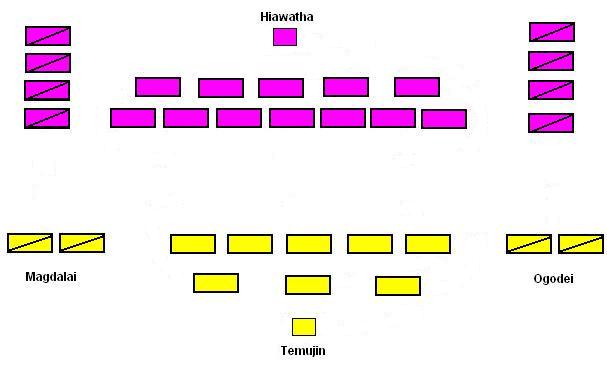
With a series of prearranged signals by flag, the Mongols intitated the battle first, their warriors screaming out a battle cry as they advanced at a disciplined walk. The Iroquois responded by rushing forward in a crazed mass, firing their muskets as they went. On the sides, the cavalry of both sides charged forward to engage in a confused mass of fighting. The crashing sound of the two armies meeting was immense, punctuated periodically by the screams of the dead and dying.
Temujin calmly waited with his guards in the back of the battle, waiting to see what developed. The smoke of musket fire formed a dense cloud covering much of the battlefield in a thick haze, preventing the khan from seeing directly what happened. He relied on a series of messengers rushing to and from the commanders of each division to serve as his "eyes" in the field. Temujin quickly learned that the two groups of infantry had reached a deadlock in the center of the plains, with neither side able to break through the lines of the other. He nodded when hearing the message; that was what he had expected, and it meant that his numerically smaller forces were acquitting themselves well.
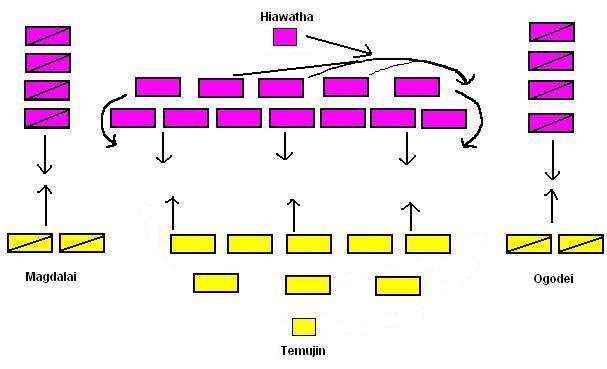
The first word from Ogodei was very good news; he had routed the Iroquois cavalry and was moving forward. This was countered by bad news on the left, where the overwhelming Iroquois numbers were threatening to pierce the line there. Temujin dispactched one of his reserve divisions to steady that side, hoping that no breakthrough would occur. For that matter, there had been no word from Magdalai yet; Temujin had no idea where the man was, and could only pray that everything was going well over there.
About an hour into the battle came word from Ogodei that the situation had dramatically changed. A hastily scribbled message told the story: "Advanced into a trap. Many, many enemy units on the right. Defeat imminent, please send help!" There was no time to waste, so Temujin rallied his forces and charged as fast as possible to the right side of the lines, bringing his final two reserve divisions and the Iron Fists with him. Arriving at the scene, he found that the situation was even worse than he had feared; the entire right side of the Mongol army was on the point of collapse, barely being held in check by the shattered remnants of Ogodei's cavalry. Even as he watched, Temujin saw Iroquois infantry streaming through a massive gap on the right side. Within moments, his right would collapse and the battle would be over.
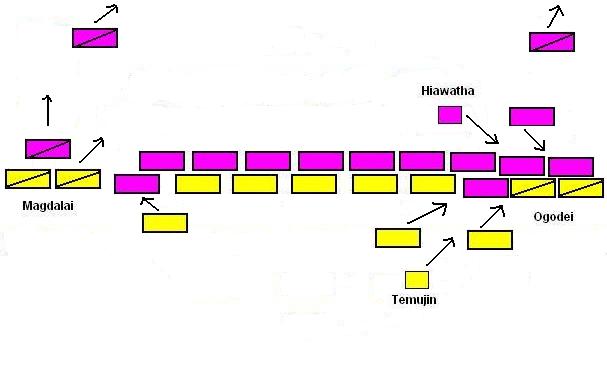
Roaring a battle cry, Temujin lead his forces head-on into the gap. Bullets whipped and cracked past his head as he directed men here and there with his sword. They had managed to plug the hole, but it was clear that this was only a temorary relief. The enemy forces had overwhelming numbers on their side, and Temujin had lost all contact with the rest of his army. Every division was fighting on its own now, and if even one of them should break... An Iroquois face reared up in front of Temujin suddenly, and without thinking the khan cut him down with his sword. It was not a ceremonial one, and the edge was wickedly sharp.
With a start, the khan realized that most of his bodyguard had been killed around him, desperately trying to hold the lines. Snarling to himself, Temujin held his ground and smoothly killed one man after another, dancing from form to form as though he was fencing rather than fighting for his life on the battlefield. He could see the purple banner of Hiawatha in the rear of the enemy lines, mocking all his efforts. It was all lost now, the battle was a failure. Hiawatha had anticipated exactly what he planned to do and used his numbers to full advantage. To Temujin, the pain of knowing he had failed was worse than any physical ailment.
Without warning, Hiawatha's flag in the distance toppled and fell from view. Temujin blinked from surprise; what was happening? The Iroquois seemed to sense that something was wrong; suddenly they were hesitant, no longer as sure of themselves. Temujin was not about to waste the opportunity; rallying those around him, he led a renewed charge forward. Within moments the source of the chaos was apparent: someone was attacking the Iroquois lines from behind! With the enemy forces packed together so tightly, there was no space for them to turn and meet the new foe, and panic quickly broke out. A quarter of an hour later, the battle was a rout as the Iroquois forces were slaughtered from all sides by Mongol attackers. The situation of those inside the dense pocket of trapped Iroquois was horrendous, and the slaughter went on for most of the day, with very few escaping to live another day.
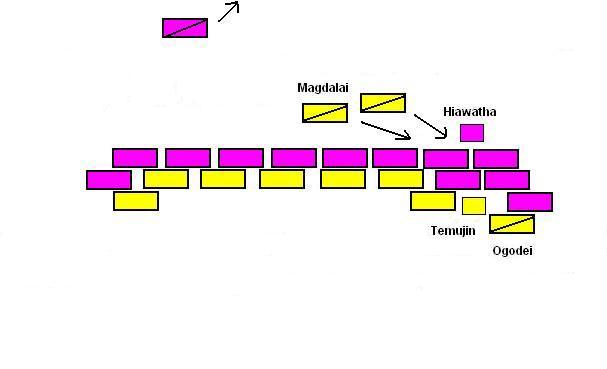
It was a grinning Magdalai who later that day explained the sudden and unexpected victory. He had destroyed the outdated Iroquois cavalry on the left easily and realized that there were no forces at all in reserve to check them; everyone had moved to the right side, including Hiawatha and his guard. Magdalai had broke off pursuit of the retreating Iroquois cavalry and wheeled his forces around to smash the main body of the army from behind. The Iroquois high command was the first to fall, Hiawatha being crushed to death under the iron hooves of one of the horses. His body had been recovered from the field, but it was in such deplorable shape that there was no chance of displaying it as a trophy.
"Even so, it was a close thing," remarked Temujin to his new top general. "If you had been even five minutes slower in attacking, we would have been overrun and it would have our bodies burning in the fires." He made reference to the massive pillars of sooty flame being used to clear the battlefield even as they spoke. The khan's face hardened until it was as tough as steel. "But I'm still bothered by one thing. We were betrayed out there today; they knew exactly where we were going to hit them, and they overloaded the right side to take advantage of that." It had cost him dearly too: Ogodei was among those who had not come back from the fight. He had charged right into a wall of iron pikes; they had known that he would be coming. There was even less remaining of Ogodei than there was of Hiawatha.
"I swear that I will find out who was the traitor in our ranks and make him pay dearly!" vowed the khan in an icy cold voice. Magdalai backed away, feeling a tinge of fear for the first time in his life. At least there was an easy target at hand for Temujin's anger; Salamanca and all of the Iroquois Confederacy were going to be in for some rough treatment in the days ahead.
Written by Sullla
Temujin mopped his brow free of the sweat that lightly dewed his forehead. Within seconds a fresh dribble of moisture burst out, due undoubtably to the sweltering summer heat in these tropical latitudes. Accepting the inevitable with regards to the climate, he turned to review his gathered army once again on the plains below his high vantage point.
The khan had assembled a mighty force here to do battle with the Iroquois, upon whom the Mongols had recently declared war. Equipped with new cavalry forces, they had already razed the city of Niagra to the ground and moved deep into the territory of the Iroquois Confederacy, seeking to destroy the capital city and smash the power of their foes once and for all. This mission was considered important enough for Temujin to risk going himself in person to command the armed forces; for as good as his generals were in battle, no one was as skilled as the wily khan. After weeks of marching through enemy territory, he knew that today was the day in which the campaign would be decided. The city of Salamanca lay just over the horizon in the east, close enough that last night they could see its lights shining out against the darkness. Drawn up to meet them in front of the city was a vast host of forces, considerably larger than what Temujin had brought, there to make a final stand outside their beloved capital. Rumor had it that Hiawatha was commanding the Iroquois army in person; Temujin hoped that it was so, because he knew that the chief was no general and would likely make serious mistakes in the heat of battle.
There was little to do this morning; he had already made his rousing speech to the men last night around the blazing light of huge bonfires, letting the sound of their answering roars echo out and down the grasslands below to the city where the people would cower in fear at the noise. The plan for today's action was already set as well, at least as much as any plan could exist before a battle, but Temujin stopped to speak with his two right-hand men one more time.
"Yes, yes, I know; my job is to command the left cavalry wing and defend our flank on that side," said Magdalai tonelessly. He once again had the blue-collar job to play in this battle, with the goal of defending the left from Hiawatha's cavalry. "I won't let you down in this fight, sir," said the man in sincere tones.
Temujin liked Magdalai a lot; another individual who had virtually no recognizable talents but scraped, clawed, and bit his way into power and authority. Unlike his other general for today's action, he could afford to give Magdalai a longer leash. "Good. If you see an opportunity in today's battle, I want you to take it. Anything can happen out there, and I don't want you held back by outdated orders. You have my trust in your decision-making abilities."
"Thank you sir!" exclaimed the other man. Temujin nodded and left, leaving a very eager Magdalai behind. The khan was known for keeping everyone working for him under very tight control; this was truly an honor indeed.
Magdalai was already out of Temujin's mind, however, as he strode up to the tent of his other commander for the day. Ogodei was in charge of the right side of the line; his cavalry would be the striking arm of the Mongol force, with the goal of punching through the opposing Iroquois force and taking the enemy army from behind. It was the sort of straight-forward task that the bull-headed Ogodei should be able to handle well - so long as nothing unexpected came up. That was the one thing that Temujin worried about.
"Oh, what am I supposed to do today?" said Ogodei blankly when pressed on the issue by Temujin. "Uhh, charge, of course! Don't worry, we'll carve them to bits and smash the rest of those guys from behind. It'll be easy!" he promised offhandedly.
"See that it is," was the curt response from Temujin. He was holding the center of the line today, back with the reserves to deploy them when and where necessary. If all went well, Ogodei would break through on the right side and he would send his forces to exploit the gaps in the Iroquois lines. The Mongols were outnumbered today, but Temujin well knew that an army attacked from behind or in flank could quickly turn into a panicked mess, easily slaughtered by a much smaller force. He also expected to have a technological edge, as his cavalry was equipped with rifles while the Iroquois still fielded knights in armor and even Mounted Warriors with bows and arrows. It would have to be enough; there was no longer time to make more changes.
Barely an hour later the two armies were drawn up on opposing sides of the field, facing one another across an expanse of several hundred yards. Temujin had five divisions of infantry in his front line, mostly equipped with muskets and a few with the newer rifles, and three more divisions held slightly back in reserve. His own small group of elite bodyguards, the Iron Fists, was also back from the front line to follow the khan around the battlefield. His cavalry was divided into two halves and placed on either side of the field to protect his flanks, with Ogodei commanding the group on the right and Magdalai the left. It was a fairly standard formation, one from which he could adapt to the changing conditions of the battle.
On the opposite side, the Iroquois had taken a similar shape. His infantry was considerably larger in number than Temujin, at roughly 12 divisions, and also equipped with muskets. Hiawatha had packed them all tightly together, with little allocation made for a strategic reserve. His cavalry was also on the wings, but in a very unusual line shape which made little sense from a tactical standpoint. The Mongols were outnumbered in cavalry by more than a 2:1 ratio, but fortunately the Iroquois mounted units were of a far lower quality. It appeared as though the Iroquois plan was to simply overwhelm the Mongols with sheer numbers; if that happened and the lines broke, it would be the Mongols that were butchered on the field.

With a series of prearranged signals by flag, the Mongols intitated the battle first, their warriors screaming out a battle cry as they advanced at a disciplined walk. The Iroquois responded by rushing forward in a crazed mass, firing their muskets as they went. On the sides, the cavalry of both sides charged forward to engage in a confused mass of fighting. The crashing sound of the two armies meeting was immense, punctuated periodically by the screams of the dead and dying.
Temujin calmly waited with his guards in the back of the battle, waiting to see what developed. The smoke of musket fire formed a dense cloud covering much of the battlefield in a thick haze, preventing the khan from seeing directly what happened. He relied on a series of messengers rushing to and from the commanders of each division to serve as his "eyes" in the field. Temujin quickly learned that the two groups of infantry had reached a deadlock in the center of the plains, with neither side able to break through the lines of the other. He nodded when hearing the message; that was what he had expected, and it meant that his numerically smaller forces were acquitting themselves well.

The first word from Ogodei was very good news; he had routed the Iroquois cavalry and was moving forward. This was countered by bad news on the left, where the overwhelming Iroquois numbers were threatening to pierce the line there. Temujin dispactched one of his reserve divisions to steady that side, hoping that no breakthrough would occur. For that matter, there had been no word from Magdalai yet; Temujin had no idea where the man was, and could only pray that everything was going well over there.
About an hour into the battle came word from Ogodei that the situation had dramatically changed. A hastily scribbled message told the story: "Advanced into a trap. Many, many enemy units on the right. Defeat imminent, please send help!" There was no time to waste, so Temujin rallied his forces and charged as fast as possible to the right side of the lines, bringing his final two reserve divisions and the Iron Fists with him. Arriving at the scene, he found that the situation was even worse than he had feared; the entire right side of the Mongol army was on the point of collapse, barely being held in check by the shattered remnants of Ogodei's cavalry. Even as he watched, Temujin saw Iroquois infantry streaming through a massive gap on the right side. Within moments, his right would collapse and the battle would be over.

Roaring a battle cry, Temujin lead his forces head-on into the gap. Bullets whipped and cracked past his head as he directed men here and there with his sword. They had managed to plug the hole, but it was clear that this was only a temorary relief. The enemy forces had overwhelming numbers on their side, and Temujin had lost all contact with the rest of his army. Every division was fighting on its own now, and if even one of them should break... An Iroquois face reared up in front of Temujin suddenly, and without thinking the khan cut him down with his sword. It was not a ceremonial one, and the edge was wickedly sharp.
With a start, the khan realized that most of his bodyguard had been killed around him, desperately trying to hold the lines. Snarling to himself, Temujin held his ground and smoothly killed one man after another, dancing from form to form as though he was fencing rather than fighting for his life on the battlefield. He could see the purple banner of Hiawatha in the rear of the enemy lines, mocking all his efforts. It was all lost now, the battle was a failure. Hiawatha had anticipated exactly what he planned to do and used his numbers to full advantage. To Temujin, the pain of knowing he had failed was worse than any physical ailment.
Without warning, Hiawatha's flag in the distance toppled and fell from view. Temujin blinked from surprise; what was happening? The Iroquois seemed to sense that something was wrong; suddenly they were hesitant, no longer as sure of themselves. Temujin was not about to waste the opportunity; rallying those around him, he led a renewed charge forward. Within moments the source of the chaos was apparent: someone was attacking the Iroquois lines from behind! With the enemy forces packed together so tightly, there was no space for them to turn and meet the new foe, and panic quickly broke out. A quarter of an hour later, the battle was a rout as the Iroquois forces were slaughtered from all sides by Mongol attackers. The situation of those inside the dense pocket of trapped Iroquois was horrendous, and the slaughter went on for most of the day, with very few escaping to live another day.

It was a grinning Magdalai who later that day explained the sudden and unexpected victory. He had destroyed the outdated Iroquois cavalry on the left easily and realized that there were no forces at all in reserve to check them; everyone had moved to the right side, including Hiawatha and his guard. Magdalai had broke off pursuit of the retreating Iroquois cavalry and wheeled his forces around to smash the main body of the army from behind. The Iroquois high command was the first to fall, Hiawatha being crushed to death under the iron hooves of one of the horses. His body had been recovered from the field, but it was in such deplorable shape that there was no chance of displaying it as a trophy.
"Even so, it was a close thing," remarked Temujin to his new top general. "If you had been even five minutes slower in attacking, we would have been overrun and it would have our bodies burning in the fires." He made reference to the massive pillars of sooty flame being used to clear the battlefield even as they spoke. The khan's face hardened until it was as tough as steel. "But I'm still bothered by one thing. We were betrayed out there today; they knew exactly where we were going to hit them, and they overloaded the right side to take advantage of that." It had cost him dearly too: Ogodei was among those who had not come back from the fight. He had charged right into a wall of iron pikes; they had known that he would be coming. There was even less remaining of Ogodei than there was of Hiawatha.
"I swear that I will find out who was the traitor in our ranks and make him pay dearly!" vowed the khan in an icy cold voice. Magdalai backed away, feeling a tinge of fear for the first time in his life. At least there was an easy target at hand for Temujin's anger; Salamanca and all of the Iroquois Confederacy were going to be in for some rough treatment in the days ahead.

